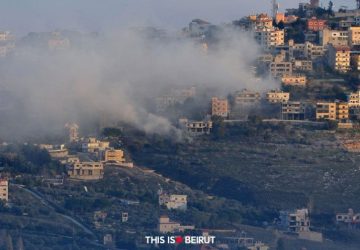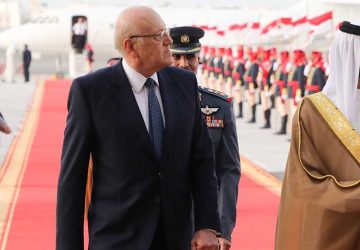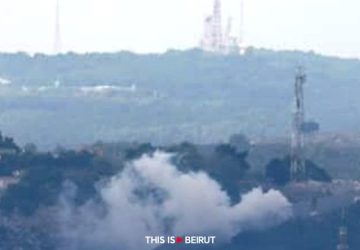Listen to the article
Even if the outcome of French envoy Jean-Yves Le Drian’s third mission to Lebanon, which officially begins on Tuesday, is difficult to predict, it seems that the presidential election issue is moving forward, both locally and internationally. Both March 8 and the opposition are pinning their hopes on this visit, each from their unique perspective.
The various political parties and blocs in Beirut are eagerly awaiting the outcome of Jean-Yves Le Drian’s third visit to Lebanon. Le Drian, French President Emmanuel Macron’s personal representative for Lebanon, has embarked on bilateral talks in the Lebanese capital on Tuesday.
In this context, the question arises as to whether this visit, the third after those he made last June and July, will help break the presidential deadlock, more than 10 months since the presidency became vacant?
“That’s the million-dollar question,” an opposition MP responds.
“They say he brings something new; we’re waiting to see,” a parliamentary source notes.
For its part, a diplomatic source states, “We shall see after the bilateral talks he will be holding with all the parliamentary blocs.”
According to this source, recent developments in Lebanon have created “a certain momentum,” signaling that several Lebanese players have realized “the urgency of the situation.”
There was the incident in Kahaleh on August 9, when a Hezbollah truck carrying ammunition overturned, leading to a shootout between local residents and Hezbollah elements, killing a Kahaleh resident and the truck driver. This serious episode led to the radicalization of the opposition against Hezbollah.
Meanwhile, the leader of the Free Patriotic Movement (FPM), Gebran Bassil, resumed his dialogue with Hezbollah, and is reportedly less reticent about the election of Marada leader Sleiman Frangieh, the March 8 candidate, as president.
Merger of the Two Initiatives?
Another development was the speech made by the Speaker of Parliament and leader of the Amal movement, Nabih Berri, on August 31, and his call for “a seven-day dialogue during the month of September, at the end of which successive parliamentary sessions will be held until the election of a President of the Republic.”
Berri went on Monday so far as to predict in a statement to the daily Al-Liwaa a “merger” between his proposal and the French initiative, as in his view they “complement each other.”
While in some diplomatic circles, the call for dialogue and the parliamentary leader’s mention of an open ballot were rather well received, this was not the case in opposition ranks. “Is there any synchronization between the two initiatives, and how can Berri call for a dialogue table when Le Drian has neither completed his mission nor renounced his initiative?” an opposition source wondered.
Verbal Response from the Opposition
The sovereignist blocs, which had refused to reply in writing to the two questions Le Drian had asked MPs in a letter sent on August 15, concerning the portrait and priorities of the next head of state, replied verbally to the French envoy, insisting in particular on the refusal of a multilateral dialogue “which would constitute a dangerous precedent for Lebanese democracy.”
Speaking on behalf of 31 opposition MPs (members of the Lebanese Forces, the Kataeb, the Renewal blocs and three Change MPs), and mandated by them, MP Michel Moawad gave the new French ambassador, Hervé Magro, a clear response on this subject.
In essence, these 31 MPs welcome the French initiative and are open to a compromise solution that could lead to the election of a President of the Republic. They consider that they have demonstrated their openness by pivoting from supporting Moawad’s candidacy to that of former minister Jihad Azour, on which they have found common ground with a segment of the ruling forces.
These MPs are committed to France’s role as “facilitator/mediator,” which the country needs, but stress the importance of two red lines: firstly, the rejection of the election of a president from the moumanaa (pro-Hezbollah) camp and, secondly, the rejection of “the institutionalization of a multilateral dialogue table” prior to the presidential election. In the past, this kind of dialogue took place “at the expense of the Constitution” and “contributed to the creation of a Loya Jirga (a large traditional assembly that takes decisions in Afghanistan), for which Lebanon has since been paying the price.”
According to the opposition, discussions are underway among MPs, and the endorsement of Jihad Azour’s candidacy is precisely the result of such a dialogue.
The 31 opposition MPs issued a statement after Le Drian’s departure, welcoming his initiative but rejecting the option of dialogue, emphasizing that their primary objective is to elect a Head of State who will spearhead a national dialogue centered on Hezbollah’s weapons.
Verbal and Written Responses
On the other hand, sources close to March 8 believe that the French initiative and Berri’s proposal are very similar and have the same aim: to elect a President of the Republic. But while France has asked MPs to “present their homework” in writing, the Speaker has invited them to “recite it orally,” the source humorously notes.
Within March 8 circles, some believe that even if Le Drian has accepted the principle of bilateral talks with his interlocutors because the opposition refuses the option of multilateral dialogue, Paris has not abandoned the idea of bringing all the blocs together around the same dialogue table, at a later date, before holding an open electoral ballot.
According to these sources, Berri’s initiative is designed to promote the election of a president. The dialogue will ultimately lead to the identification of one, two, three, or four candidates, with the final decision being made through a vote.
However, the above-mentioned sources openly acknowledge that this camp remains committed to Sleiman Frangieh’s candidacy. In this context, they point out that time is running out, reminding that the State is threatened by numerous dangers, notably the growing number of displaced Syrians and the fighting in Ain el-Helwe.
International Momentum
On the international front, in Paris and shortly before his departure for Beirut, Le Drian met on Monday with two Saudi officials directly concerned with the country: the Saudi ambassador to Lebanon, Walid Boukhari, and the official in charge of Lebanese affairs in Riyadh, Nizar al-Alaoula.
According to a diplomatic source, this meeting reflects “the importance of coordination” between France and Arabia on the Lebanese file. These two countries, along with Egypt, Qatar and the US, make up the Group of Five, which is trying to break the presidential deadlock in Lebanon.
Le Drian had already held talks with Saudi Foreign Minister Faisal ben Farhane in Jeddah on July 18, in the presence of Alaoula, the day after the quintet’s meeting in Doha.
He also met Qatari Foreign Minister Mohammad Abdel Aziz al-Khoulaifi. Of note, Doha is playing a discreet but increasingly active role in Lebanon, as it has already sent more than one emissary to discuss the presidency.
In this context, sources close to March 8 and others close to the opposition point to a discrepancy between the French and Qatari mediation, stressing that Doha clearly supports the election of the army’s Commander-in-Chief, General Joseph Aoun.
One observer points out that the head of Hezbollah’s parliamentary bloc, Mohammed Raad, recently met with General Joseph Aoun, stressing that this meeting was significant.
As for the other presidential candidates, sovereignist MPs note that despite its dialogue with Hezbollah, the FPM, which had “converged” with the opposition on the candidacy of Azour, and had voted for him during the last electoral session, confides in its meetings with the opposition that it maintains this position. The Progressive Socialist Party bloc expresses the same position, according to these MPs.
Will Le Drian’s third mission succeed in unblocking the presidential election? Everything will depend on how his meetings with the parliamentary blocs go. In any case, March 8 and the opposition, each in its own way, are banking on the result of France’s mediation.





